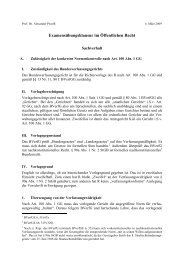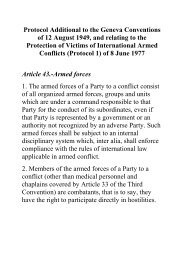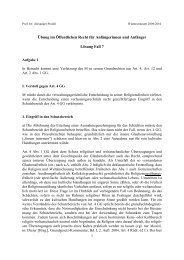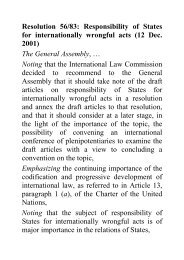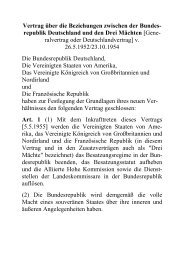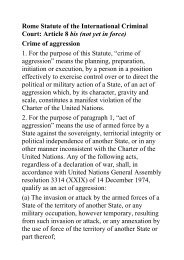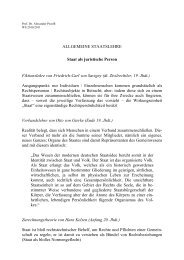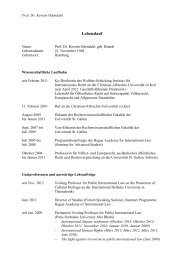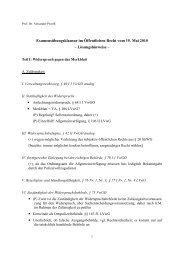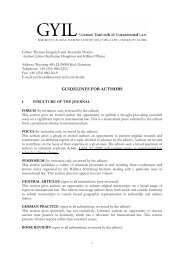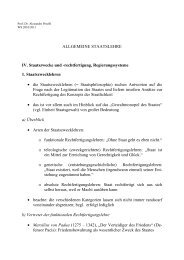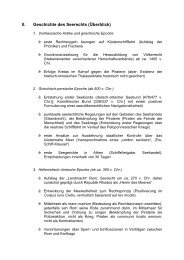Protection of the Marine Environment Protection of the Marine ...
Protection of the Marine Environment Protection of the Marine ...
Protection of the Marine Environment Protection of the Marine ...
You also want an ePaper? Increase the reach of your titles
YUMPU automatically turns print PDFs into web optimized ePapers that Google loves.
22.07.2010<br />
<strong>Protection</strong> <strong>of</strong> <strong>the</strong> <strong>Marine</strong> <strong>Environment</strong><br />
• I. Introduction<br />
• <strong>the</strong> relevant legal source is <strong>the</strong> UN Convention on <strong>the</strong> Law <strong>of</strong> <strong>the</strong> Sea<br />
(UNCLOS), which was adopted in 1982 and entered into force in 1994; it can<br />
be considered to be <strong>the</strong> “Constitution <strong>of</strong> <strong>the</strong> Seas” and contains a separate<br />
part XII for <strong>the</strong> protection and conservation <strong>of</strong> <strong>the</strong> marine environment.<br />
• UNCLOS is a framework convention, which is subject to specification on<br />
universal, regional and national level by way <strong>of</strong> fur<strong>the</strong>r treaties.<br />
• <strong>the</strong> majority <strong>of</strong> <strong>the</strong> numerous relevant treaties refer to particular aspects <strong>of</strong><br />
marine protection such as <strong>the</strong> introduction <strong>of</strong> material into <strong>the</strong> marine<br />
environment, shipping as a source <strong>of</strong> pollution, <strong>the</strong> introduction <strong>of</strong> waste<br />
(“dumping”) and <strong>the</strong> protection <strong>of</strong> marine resources (protection <strong>of</strong> species<br />
and stocks)<br />
International Law <strong>of</strong> <strong>the</strong> Sea<br />
Pr<strong>of</strong>. Dr. Alexander Proelß<br />
<strong>Protection</strong> <strong>of</strong> <strong>the</strong> <strong>Marine</strong> <strong>Environment</strong><br />
• II. <strong>Protection</strong> <strong>of</strong> <strong>the</strong> <strong>Marine</strong> <strong>Environment</strong> under UNCLOS<br />
• Part XII <strong>of</strong> UNCLOS refers primarily to <strong>the</strong> pollution <strong>of</strong> <strong>the</strong> marine<br />
environment, not to <strong>the</strong> protection and sustainable use <strong>of</strong> marine species<br />
• regarding <strong>the</strong> protection <strong>of</strong> species and fish stocks, <strong>the</strong> pertinent regulations<br />
were foremost placed within <strong>the</strong> context <strong>of</strong> <strong>the</strong> Economic Exclusive Zone (EEZ)<br />
and <strong>the</strong> High Seas, thus <strong>the</strong> protection is spatialized; this implies that <strong>the</strong><br />
living resources are distributed amongst different actors.<br />
• it should be noted, though, that according to Art. 194 (5) UNCLOS measures<br />
taken in accordance with Part XII “shall include those necessary to protect and<br />
preserve rare or fragile ecosystems as well as <strong>the</strong> habitat <strong>of</strong> depleted,<br />
threatened or endangered species and o<strong>the</strong>r forms <strong>of</strong> marine life”<br />
International Law <strong>of</strong> <strong>the</strong> Sea<br />
Pr<strong>of</strong>. Dr. Alexander Proelß<br />
1
22.07.2010<br />
<strong>Protection</strong> <strong>of</strong> <strong>the</strong> <strong>Marine</strong> <strong>Environment</strong><br />
• some authors suggest that Art. 194 (5) UNCLOS provides <strong>the</strong> basis for <strong>the</strong><br />
authorization <strong>of</strong> a coastal State to take measures in regard to <strong>the</strong> protection<br />
<strong>of</strong> stock and species<br />
• if this view is followed, a coastal state would be able to rely on Art. 56 (1)<br />
(b) (iii) UNCLOS in conjunction with Art. 194 (5) UNCLOS in order to<br />
designate protected areas in its EEZ from which ships <strong>of</strong> o<strong>the</strong>r States<br />
could be excluded<br />
• interpreted correctly, however, Art. 194 (5) UNCLOS cannot be understood as<br />
a norm providing for <strong>the</strong> competence to establish individual protection<br />
measures; it ra<strong>the</strong>r represents a mere “opening clause”; this arises from <strong>the</strong><br />
reservation “in accordance with this part”, which refers among o<strong>the</strong>rs to Art.<br />
194 (1) UNCLOS, which itself requires that all measures in relation to <strong>the</strong><br />
protection <strong>of</strong> <strong>the</strong> marine environment shall be “consistent with this<br />
Convention”. As to <strong>the</strong> designation <strong>of</strong> marine protected areas in <strong>the</strong> EEZ, Art.<br />
211 (5) UNCLOS contains a special regulation which must be respected<br />
according to Art. 194 (1) UNCLOS<br />
International Law <strong>of</strong> <strong>the</strong> Sea<br />
Pr<strong>of</strong>. Dr. Alexander Proelß<br />
<strong>Protection</strong> <strong>of</strong> <strong>the</strong> <strong>Marine</strong> <strong>Environment</strong><br />
• it follows from <strong>the</strong> foregoing that <strong>the</strong> structural principles set out<br />
in Part XII UNCLOS (precautionary principle etc) not only apply for<br />
<strong>the</strong> protection <strong>of</strong> <strong>the</strong> marine environment in regard to pollution,<br />
but also for <strong>the</strong> protection <strong>of</strong> species and stocks<br />
• this has been confirmed by <strong>the</strong> International Tribunal <strong>of</strong> <strong>the</strong><br />
Law <strong>of</strong> <strong>the</strong> Sea (ITLOS) in <strong>the</strong> Sou<strong>the</strong>rn-Bluefin Tuna Case:<br />
“Considering that <strong>the</strong> conservation <strong>of</strong> <strong>the</strong> living resources <strong>of</strong><br />
<strong>the</strong> sea is an element in <strong>the</strong> protection and preservation <strong>of</strong><br />
<strong>the</strong> marine environment” (ITLOS Reports 1999, 280, 295)<br />
• UNCLOS is consequently based on a holistic approach, with <strong>the</strong><br />
primary focus being on <strong>the</strong> issue <strong>of</strong> sustainable development<br />
International Law <strong>of</strong> <strong>the</strong> Sea<br />
Pr<strong>of</strong>. Dr. Alexander Proelß<br />
2
22.07.2010<br />
<strong>Protection</strong> <strong>of</strong> <strong>the</strong> <strong>Marine</strong> <strong>Environment</strong><br />
• cf. also Paragraph 3 <strong>of</strong> <strong>the</strong> Preamble to UNCLOS : “Conscious that <strong>the</strong><br />
problems <strong>of</strong> ocean space are closely interrelated and need to be<br />
considered as a whole.”<br />
• 1. Structure and General Principles <strong>of</strong> Part XII UNCLOS<br />
• Part XII UNCLOS opens with <strong>the</strong> general and comprehensive Article 192,<br />
according to which states are obliged “to protect and preserve <strong>the</strong> marine<br />
environment”<br />
• this legal obligation is also applicable under customary international<br />
law; it is debatable, however, whe<strong>the</strong>r it is an obligation erga omnes<br />
(<strong>the</strong> consequence would be that infringements can be sanctioned by<br />
all states [controversial!]; probably no “persistent objection”<br />
possible)<br />
International Law <strong>of</strong> <strong>the</strong> Sea<br />
Pr<strong>of</strong>. Dr. Alexander Proelß<br />
<strong>Protection</strong> <strong>of</strong> <strong>the</strong> <strong>Marine</strong> <strong>Environment</strong><br />
• Art. 192 on one hand and Art. 194 on <strong>the</strong> o<strong>the</strong>r symbolize <strong>the</strong><br />
traditional antagonism between <strong>the</strong> State´s interest in protecting<br />
<strong>the</strong> environment and <strong>the</strong> use <strong>of</strong> <strong>the</strong> marine resources; but note<br />
that <strong>the</strong> wording <strong>of</strong> Art.193 UNCLOS only refers to <strong>the</strong> resources<br />
located in areas within <strong>the</strong> limits <strong>of</strong> national jurisdiction<br />
• <strong>of</strong> all <strong>the</strong> general principles <strong>of</strong> international environmental law,<br />
only <strong>the</strong> prohibition against transboundary environmental harm<br />
(Art. 194 (2) UNCLOS) and <strong>the</strong> principle <strong>of</strong> origin (cf. Art. 195<br />
UNCLOS; <strong>the</strong> transfer <strong>of</strong> damage would conflict with <strong>the</strong> principle<br />
that pollution must preferably be countered at its origin) are<br />
explicitly mentioned in Part XII UNCLOS<br />
• but: as shown above, <strong>the</strong> precautionary principle is contained<br />
implicitly (Art. 194 (5) UNCLOS) in Part XII UNCLOS and must,<br />
<strong>the</strong>refore, also be considered as forming part <strong>of</strong> <strong>the</strong> legal<br />
framework concerning <strong>the</strong> protection <strong>of</strong> stocks and species<br />
International Law <strong>of</strong> <strong>the</strong> Sea<br />
Pr<strong>of</strong>. Dr. Alexander Proelß<br />
3
22.07.2010<br />
<strong>Protection</strong> <strong>of</strong> <strong>the</strong> <strong>Marine</strong> <strong>Environment</strong><br />
• although Art. 194 (1) UNCLOS only mentions <strong>the</strong> prevention,<br />
reduction and control <strong>of</strong> pollution <strong>of</strong> <strong>the</strong> marine environment<br />
(which ra<strong>the</strong>r militates in favour <strong>of</strong> <strong>the</strong> preventative principle<br />
[= <strong>the</strong> prevention <strong>of</strong> environmental hazards]), <strong>the</strong> relevance<br />
<strong>of</strong> <strong>the</strong> precautionary principle results from <strong>the</strong> definition <strong>of</strong><br />
“pollution” in Art. 1 (1) No. 4 UNCLOS (“<strong>the</strong> introduction by<br />
man, directly or indirectly, <strong>of</strong> substances or energy [...], which<br />
results or is likely to result in such deleterious effects as harm<br />
to living resources [...]”)<br />
• cf. also <strong>the</strong> ITLOS in <strong>the</strong> Sou<strong>the</strong>rn Bluefin Tuna-Case: “<strong>the</strong><br />
parties should in <strong>the</strong> circumstances act with prudence and<br />
caution to ensure that effective conservation measures are<br />
taken to prevent serious harm to <strong>the</strong> stock <strong>of</strong> sou<strong>the</strong>rn<br />
bluefin tuna“ (ITLOS Reports 1999, 280, 296)<br />
International Law <strong>of</strong> <strong>the</strong> Sea<br />
Pr<strong>of</strong>. Dr. Alexander Proelß<br />
<strong>Protection</strong> <strong>of</strong> <strong>the</strong> <strong>Marine</strong> <strong>Environment</strong><br />
• however: as a result <strong>of</strong> <strong>the</strong> lack <strong>of</strong> codification within <strong>the</strong><br />
framework <strong>of</strong> UNCLOS, one cannot assume that in <strong>the</strong> case that a<br />
State denies <strong>the</strong> hazardous nature <strong>of</strong> one <strong>of</strong> its actions, <strong>the</strong><br />
burden <strong>of</strong> pro<strong>of</strong> is imposed on that State (no reversal <strong>of</strong> <strong>the</strong><br />
burden <strong>of</strong> pro<strong>of</strong>; <strong>the</strong> contrary result is only valid within <strong>the</strong><br />
framework <strong>of</strong> <strong>the</strong> regional OSPAR-Convention); a.A. Request for an<br />
Examination [...], Diss. Opinion Weeramantry, ICJ Reports 1995,<br />
287, 317, 343<br />
• <strong>the</strong> general rules <strong>of</strong> Arts. 192-196 UNCLOS are followed by Arts. 207-<br />
212 UNCLOS which contain special provisions in respect <strong>of</strong> marine<br />
pollution from different sources (land-based sources; introduction <strong>of</strong><br />
foreign substances; activities on <strong>the</strong> Continental Shelf and in <strong>the</strong> Area;<br />
pollution from <strong>the</strong> air or through <strong>the</strong> air; by shipping), as well as by<br />
corresponding specifications with regard to <strong>the</strong> enforcement <strong>of</strong> <strong>the</strong><br />
material legal rules (Arts. 213-222 UNCLOS)<br />
International Law <strong>of</strong> <strong>the</strong> Sea<br />
Pr<strong>of</strong>. Dr. Alexander Proelß<br />
4
22.07.2010<br />
<strong>Protection</strong> <strong>of</strong> <strong>the</strong> <strong>Marine</strong> <strong>Environment</strong><br />
• all <strong>of</strong> <strong>the</strong>se provisions, even though <strong>the</strong>y are only directed at one<br />
source <strong>of</strong> pollution respectively, are subject to fur<strong>the</strong>r<br />
specification on <strong>the</strong> universal, regional and national level<br />
• 2. Specification on <strong>the</strong> universal level<br />
• a) Pollution from land-based sources<br />
• in respect <strong>of</strong> land-based pollution, which is responsible for 2/3<br />
<strong>of</strong> <strong>the</strong> marine pollution, attempts to negotiate an universal<br />
agreement have so far remained unsuccessful; previous<br />
endeavours have only resulted in <strong>the</strong> legally non-binding<br />
Programme <strong>of</strong> Action for <strong>the</strong> <strong>Protection</strong> <strong>of</strong> <strong>the</strong> <strong>Marine</strong><br />
<strong>Environment</strong> from Land-Based Activities (UN Doc A/51/116,<br />
Annex II)<br />
International Law <strong>of</strong> <strong>the</strong> Sea<br />
Pr<strong>of</strong>. Dr. Alexander Proelß<br />
<strong>Protection</strong> <strong>of</strong> <strong>the</strong> <strong>Marine</strong> <strong>Environment</strong><br />
• however: land-based pollution is <strong>the</strong> primary task <strong>of</strong> terrestrial<br />
environmental and freshwater protection (see, e.g. <strong>the</strong> Water<br />
Framework Directive <strong>of</strong> <strong>the</strong> European Community, which includes<br />
coastal waters)<br />
• b) Pollution by dumping<br />
• with regard to <strong>the</strong> type <strong>of</strong> pollution being qualified as “dumping”,<br />
<strong>the</strong> specification <strong>of</strong> <strong>the</strong> UNCLOS provisions concerned is provided by<br />
<strong>the</strong> Convention on <strong>the</strong> Prevention <strong>of</strong> <strong>Marine</strong> Pollution by Dumping<br />
<strong>of</strong> Wastes and O<strong>the</strong>r Matter <strong>of</strong> 1972, commonly called <strong>the</strong> “London<br />
Convention”; UNCLOS refers to this treaty in Art. 210 (6) by means <strong>of</strong><br />
a reference to <strong>the</strong> words “global rules and standards“, <strong>the</strong>reby<br />
establishing a minimum standard<br />
• consequently, States parties to UNCLOS are indirectly bound to <strong>the</strong><br />
London Convention, no matter if <strong>the</strong>y have acceded to it or not<br />
International Law <strong>of</strong> <strong>the</strong> Sea<br />
Pr<strong>of</strong>. Dr. Alexander Proelß<br />
5
22.07.2010<br />
<strong>Protection</strong> <strong>of</strong> <strong>the</strong> <strong>Marine</strong> <strong>Environment</strong><br />
• according to <strong>the</strong> London Protocol <strong>the</strong>re exists a general<br />
prohibition to dump<br />
• in view <strong>of</strong> <strong>the</strong> small number <strong>of</strong> accessions to <strong>the</strong> London Protocol,<br />
<strong>the</strong> Contracting Parties to <strong>the</strong> London Convention have in recent<br />
years partially aligned its provisions to <strong>the</strong> ones contained in <strong>the</strong><br />
Dumping Protocol by means <strong>of</strong> enlarging <strong>the</strong> “black-list” in <strong>the</strong> tacitacceptance<br />
procedure<br />
• c) Pollution from shipping<br />
• <strong>the</strong> specification <strong>of</strong> this type <strong>of</strong> pollution is essentially made effective<br />
through <strong>the</strong> detailed guidelines <strong>of</strong> <strong>the</strong> International Convention for<br />
<strong>the</strong> Prevention <strong>of</strong> Pollution From Ships <strong>of</strong> 1973 (MARPOL) with its 6<br />
Annexes and <strong>the</strong> Protocol from 1978<br />
International Law <strong>of</strong> <strong>the</strong> Sea<br />
Pr<strong>of</strong>. Dr. Alexander Proelß<br />
<strong>Protection</strong> <strong>of</strong> <strong>the</strong> <strong>Marine</strong> <strong>Environment</strong><br />
• MARPOL is a framework Convention which was negotiated under <strong>the</strong><br />
auspices <strong>of</strong> <strong>the</strong> IMO; besides some very general principles and rules, <strong>the</strong><br />
Convention merely contains procedural regulations on amendments and<br />
settlement <strong>of</strong> disputes<br />
• MARPOL has 6 annexes which contain <strong>the</strong> material standards relevant to<br />
<strong>the</strong> prevention <strong>of</strong> marine pollution from ships<br />
• Annex I: Pollution <strong>of</strong> <strong>the</strong> marine environment by oil (applies<br />
automatically to all contracting parties to <strong>the</strong> Convention)<br />
• any discharge <strong>of</strong> oil mud or so-called sludge, which is produced by<br />
<strong>the</strong> operation <strong>of</strong> ship machines, is forbidden; discharges <strong>of</strong><br />
oleiferous bilgewater and residues from cargo <strong>of</strong> oil-tankers are<br />
only permitted under very strict requirements and only in small<br />
quantities or/and following dilution; normally, such residues are to<br />
be dispensed in ports in collecting ponds<br />
International Law <strong>of</strong> <strong>the</strong> Sea<br />
Pr<strong>of</strong>. Dr. Alexander Proelß<br />
7
22.07.2010<br />
<strong>Protection</strong> <strong>of</strong> <strong>the</strong> <strong>Marine</strong> <strong>Environment</strong><br />
• with <strong>the</strong> 2004 amendments (which entered into in force on 1<br />
January 2007), MARPOL was amended by, inter alia, introducing<br />
a time management plan for <strong>the</strong> phasing out <strong>of</strong> single-hull<br />
tankers<br />
• Annex II: pollution by noxious liquid substances (applies<br />
automatically)<br />
• Annex III: pollution by harmful substances in packaged form<br />
(this is an optional Annex which needs to be ratified)<br />
• Annex IV: pollution by sewage from ships (optional)<br />
International Law <strong>of</strong> <strong>the</strong> Sea<br />
Pr<strong>of</strong>. Dr. Alexander Proelß<br />
<strong>Protection</strong> <strong>of</strong> <strong>the</strong> <strong>Marine</strong> <strong>Environment</strong><br />
• Annex V: pollution by garbage from ships (optional)<br />
• Annex VI (in force since 19 May 2005): prevention <strong>of</strong> air pollution<br />
from ships (optional)<br />
• contains emissions standards for ships with regard to SOx,<br />
NOx and ozone depleting substances, but not in respect <strong>of</strong><br />
CO2 emissions<br />
• deals with <strong>the</strong> creation <strong>of</strong> „SOx emission control areas“<br />
(SECAs), i.e., special areas within which stricter requirements<br />
apply with regard to sulphur emissions, or where vessels<br />
must be equipped with an exhaust gas cleaning system or<br />
must make use any o<strong>the</strong>r technological method to limit SOx<br />
emissions (applicable in <strong>the</strong> Baltic Sea, <strong>the</strong> North Sea and <strong>the</strong><br />
Channel)<br />
International Law <strong>of</strong> <strong>the</strong> Sea<br />
Pr<strong>of</strong>. Dr. Alexander Proelß<br />
8
22.07.2010<br />
<strong>Protection</strong> <strong>of</strong> <strong>the</strong> <strong>Marine</strong> <strong>Environment</strong><br />
• note that under <strong>the</strong> revised Annex VI which was adopted<br />
in October 2008 (entry into force 1 July 2010), NOx and<br />
particulate matter were recognized as pollutants relevant<br />
for <strong>the</strong> establishment <strong>of</strong> emissions control areas; <strong>the</strong>se<br />
“ECAs” replace <strong>the</strong> former SECAs with immediate effect<br />
• it is currently discussed whe<strong>the</strong>r Annex VI may also be<br />
used as a basis to restrict greenhouse gas emissions from<br />
ships; debates focus on a potential inclusion <strong>of</strong><br />
international shipping in any kind <strong>of</strong> emissions trading<br />
scheme (global or regional)<br />
International Law <strong>of</strong> <strong>the</strong> Sea<br />
Pr<strong>of</strong>. Dr. Alexander Proelß<br />
<strong>Protection</strong> <strong>of</strong> <strong>the</strong> <strong>Marine</strong> <strong>Environment</strong><br />
• <strong>the</strong>re is a one general problem which follows from <strong>the</strong> so-called<br />
NMFT-Clause <strong>of</strong> Art. 5 (4) MARPOL: „With respect to <strong>the</strong> ships <strong>of</strong> non-<br />
Parties to <strong>the</strong> Convention, Parties shall apply <strong>the</strong> requirements <strong>of</strong> <strong>the</strong><br />
present Convention as may be necessary to ensure that no more<br />
favourable treatment is given to such ships.”<br />
• (P): Is this norm compatible with <strong>the</strong> principle <strong>of</strong> pacta tertiis nec<br />
nocent nec prosunt (Art. 34 VCLT)?<br />
• this is problematic as according to Art. 6 (2) MARPOL, coastal<br />
State authorities may control foreign ships<br />
• <strong>the</strong> most conceivable argument in this respect seems to be that<br />
since more than 130 States are parties to MARPOL (representing<br />
97% <strong>of</strong> <strong>the</strong> world trade tonnage), <strong>the</strong> Convention is valid under<br />
customary international law<br />
International Law <strong>of</strong> <strong>the</strong> Sea<br />
Pr<strong>of</strong>. Dr. Alexander Proelß<br />
9
22.07.2010<br />
<strong>Protection</strong> <strong>of</strong> <strong>the</strong> <strong>Marine</strong> <strong>Environment</strong><br />
• however, this view cannot be accepted in respect <strong>of</strong> violations <strong>of</strong><br />
pollution standards which occur seaward <strong>the</strong> coastal State´s<br />
territory (= seaward <strong>the</strong> internal waters and <strong>the</strong> territorial sea);<br />
accepting enforcement competences <strong>of</strong> <strong>the</strong> coastal State for such<br />
violations would represent an exercise <strong>of</strong> illegal extraterritorial<br />
jurisdiction and, <strong>the</strong>refore, would significantly exceed<br />
international customary law<br />
• a substantial reason for <strong>the</strong> lack <strong>of</strong> acceptance <strong>of</strong> <strong>the</strong><br />
Straddling Fish Stock Agreement is that it provides port<br />
States with extensive enforcement authority which also<br />
covers breaches <strong>of</strong> measures related to fisheries protection<br />
on <strong>the</strong> high seas (see also Art. 23 <strong>of</strong> <strong>the</strong> Fish Stocks<br />
Agreement)<br />
• prevailing opinion: NMFT-Clause has only „indirect“ or „factual“<br />
third party effect which is not covered by Art.34 VCLT<br />
International Law <strong>of</strong> <strong>the</strong> Sea<br />
Pr<strong>of</strong>. Dr. Alexander Proelß<br />
<strong>Protection</strong> <strong>of</strong> <strong>the</strong> <strong>Marine</strong> <strong>Environment</strong><br />
• it should be noted, though, that Art. 5 (4) MARPOL does not only<br />
produce an indirect political effect, but aims at indirectly legally binding<br />
third States<br />
• note also: <strong>the</strong> compatibility <strong>of</strong> comparable cases <strong>of</strong> Art. 2 (6) and Art. 102<br />
(2) <strong>of</strong> <strong>the</strong> UN-Charter with <strong>the</strong> pacta tertiis-rule is controversial<br />
• it must be borne in mind that enforcement <strong>of</strong> pollution standards<br />
relevant to <strong>the</strong> EEZ or high seas affects <strong>the</strong> principle <strong>of</strong> flag State<br />
jurisdiction and, thus, one <strong>of</strong> <strong>the</strong> basic rights <strong>of</strong> States<br />
• consequently, Art. 5 (4) MARPOL should be interpreted in a restrictive<br />
manner in conformity with Art. 3 (1) lit. b MARPOL, whereby <strong>the</strong><br />
Convention also applies to vessels which are not authorised to sail under<br />
<strong>the</strong> flag <strong>of</strong> one <strong>of</strong> <strong>the</strong> Contracting parties, but which are operating under<br />
<strong>the</strong> jurisdiction <strong>of</strong> one <strong>of</strong> <strong>the</strong> contracting parties<br />
International Law <strong>of</strong> <strong>the</strong> Sea<br />
Pr<strong>of</strong>. Dr. Alexander Proelß<br />
10



